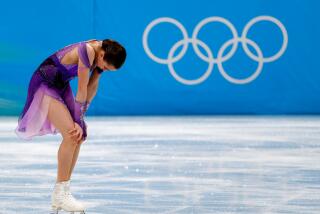Austrian Drug Tests Are Negative
- Share via
TURIN, Italy — No evidence of doping was detected in samples from 10 Austrian skiers who had to submit to surprise drug tests last weekend, the International Olympic Committee said Friday.
Urine tests conducted on the skiers -- six cross-country skiers and four biathletes -- turned up no evidence of the use of stimulants, anabolic steroids or micro-doses of the synthetic blood-doping hormone called erythropoietin, or EPO, the IOC said.
Follow-up blood tests either have been conducted or will be conducted on members of the Austrian team, said the chairman of the IOC’s medical commission, Arne Ljungqvist of Sweden. He declined to provide further details.
Austrian officials said that the negative urine samples ought to remove any cloud of suspicion.
“We are very happy that at the end of these days, it turns out there is no doping,” said Heinz Jungwirth, secretary-general of the Austrian Olympic Committee.
But the negative results do not mean the case is closed for Austrian athletes, coaches and officials. Under Italian law, doping is a crime -- with a possible two-year jail sentence.
In Sestriere, Italy, the center of the Alpine events at the 2006 Winter Games, Italian police questioned the Austrian ski team’s director, Markus Gandler, and other staff members.
During last weekend’s raids on Austrian biathlon and cross-country ski team quarters in San Sicario and Pragelato, mountain hamlets near Sestriere, police found used syringes and other items. It is not clear when forensic tests on evidence collected by the police will be completed.
The police raid was the first by law enforcement authorities on athletes’ quarters during an Olympics.
The IOC had announced earlier this week that it intended to open a separate inquiry after the Games and spokeswoman Giselle Davies said Friday that the negative tests “are only one element in what is undoubtedly an affair which goes far wider.”
She added, “The IOC takes this affair very seriously and is determined to do everything within its powers to bring full clarity.”
Austrian officials have announced they intend to pursue an inquiry, in part to allay concerns that might affect Salzburg’s bid for the 2014 Winter Olympics.
The IOC will select the 2014 site in 2007. Salzburg is a leading candidate among the seven cities in the race.
Only one athlete has tested positive at the 2006 Games, Russian biathlete Olga Pyleva for the stimulant carphedon. The IOC had announced its intent to conduct 1,200 tests at the Turin Games, up 72% from the 2002 Salt Lake City Olympics.
For the IOC and other sports authorities, the BALCO case in the United States established a precedent, allowing the prosecution of an alleged doping violation without the requirement of a positive test for proof.
Instead, authorities can use other evidence -- such as e-mails, phone calls, documents and evidence that is either seized at the scene of a search or surfaces afterward.
A French newspaper reported Friday that an Italian prosecutor had said Austrian skiers guzzled water when police arrived at the San Sicario and Pragelato houses -- in an apparent attempt to dilute any samples that might be taken.
According to L’Equipe, prosecutor Ciro Santoriello said, “Believe me, they didn’t drink like you or me. It seemed urgent, vital.”
Because some samples were diluted, IOC medical chairman Ljungqvist said, it took longer for the lab to run its array of tests.
Santoriello also told L’Equipe that police found significant quantities of the asthma drug salbutamol during the raid, adding that most of the Austrian skiers at the Pragelato house claimed to suffer from asthma -- and presented medical documents as proof.
“We will verify that because it is strange,” he said.
Salbutamol is included on the IOC’s list of banned substances. To use it at the Games, an athlete needs a “therapeutic use exemption.”
The raids last Saturday were sparked by concerns that Walter Mayer, who had been the Austrian cross-country and biathlon coach, was in or around the Turin area, even though he had been banned from the Olympics through 2010 after blood-doping equipment was found at a Utah house rented by the Austrian Nordic team for the 2002 Salt Lake City Games.
Shortly after the raids last week, Mayer crashed his car into a police blockade just over the Austrian border from Italy and ended up in a psychiatric hospital. He was fired.
More to Read
Go beyond the scoreboard
Get the latest on L.A.'s teams in the daily Sports Report newsletter.
You may occasionally receive promotional content from the Los Angeles Times.






